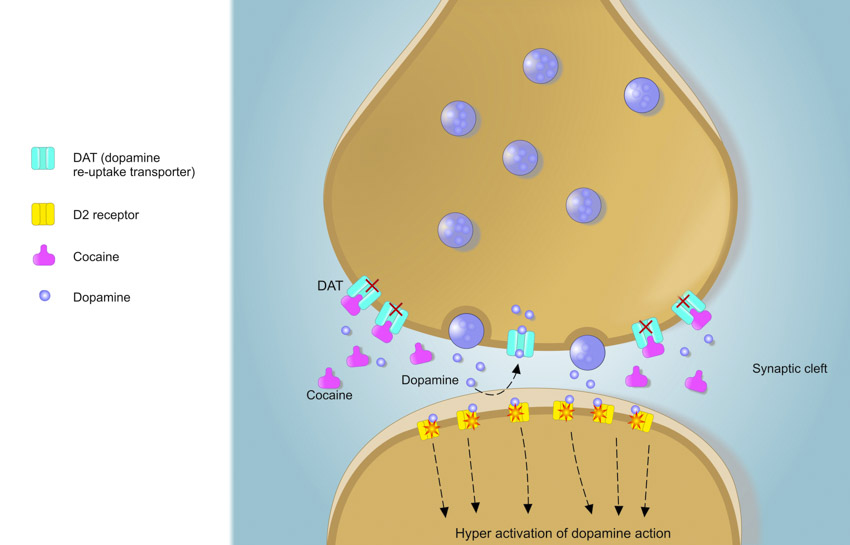 Addiction occurs when a person is physically and mentally dependent on a specific substance. Most the time, the substance is a drug. Drug addiction has always been depicted as a choice. From the outside, it has always seemed that getting rid of an addiction should be as easy as stopping the intake of the drug. However, research into drug addiction has shown that it is actually a disease of the brain. Drugs alter a very important pathway in the brain called the reward pathway by blocking the reuptake of signaling molecules, thus increasing reward signaling. Altering this pathway creates long lasting changes in the addict’s brain, which makes it very difficult for addict’s to stop their drug intake.
Addiction occurs when a person is physically and mentally dependent on a specific substance. Most the time, the substance is a drug. Drug addiction has always been depicted as a choice. From the outside, it has always seemed that getting rid of an addiction should be as easy as stopping the intake of the drug. However, research into drug addiction has shown that it is actually a disease of the brain. Drugs alter a very important pathway in the brain called the reward pathway by blocking the reuptake of signaling molecules, thus increasing reward signaling. Altering this pathway creates long lasting changes in the addict’s brain, which makes it very difficult for addict’s to stop their drug intake.
Reward Pathway
The reward system is a pathway in your brain that enhances behaviors by producing pleasure and rewarding effects following a specific behavior. After a desirable behavior, an action potential occurs in your brain, transmitting dopamine from the ventral tegmental area of the midbrain to the limbic system and frontal cortex. Dopamine binds to dopamine receptors in the synaptic space, which stimulates the neuron, creating the pleasurable sensation. Once the action potential that releases the dopamine is over, dopamine is removed from the synaptic space back into the transmitting neuron via a dopamine transporter. This ensures that the reward is cognitively linked to the stimulus.
Dopamine binds to dopamine receptors in the synaptic space, which stimulates the neuron, creating the pleasurable sensation. Once the action potential that releases the dopamine is over, dopamine is removed from the synaptic space back into the transmitting neuron via a dopamine transporter. This ensures that the reward is cognitively linked to the stimulus.
Drugs can affect the reward pathway in many ways. They can increase the level of dopamine released by increasing the amount of action potentials, block the reuptake of dopamine after the action potential, or release dopamine without an action potential. These situations cause increased and prolonged stimulation of the dopamine receptors, creating a prolonged and more intense euphoria. This overstimulation desensitizes the reward system because it isn’t able to reset before the next stimulation occurs. Your reward system will no longer be stimulated by everyday stimuli, creating a world where only drugs are rewarding. You will also begin to need higher dosages of drugs to create the same rewarding experience, as a tolerance to dopamine levels will begin to build.
Remaking the Reward Pathway
It is disheartening to understand how drugs alter the brain, but that doesn’t mean there is no way to recover from a drug addiction. There is a behavioral treatment that simulates a reward pathway to help addicts feel pleasure without the use of drugs. This treatment is called the Contingency Management program and it offers voucher based reinforcement as treatment. Whenever the addict provides a drug-free urine sample, they are rewarded with a voucher that can be used for food, movie tickets, or anything else that helps the addict live a drug-fee lifestyle. They can then associate a life without drugs with positive and rewarding effects so they no longer feel the need to take drugs to feel pleasure.
While there is more to drug addiction than the reward pathway, it is a key player in the addiction process. Understanding how this pathway in the brain is affected by drugs leads to a greater understanding of what happens when someone is suffering from addiction. This knowledge leads to the development of treatments that will accurately target the person’s needs and hopefully let them live the life they desire.